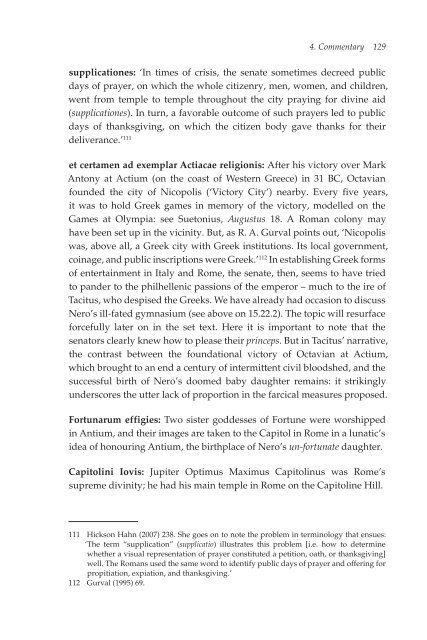Tacitus, Annals, 15.20-23, 33-45. Latin Text, Study Aids with Vocabulary, and Commentary, 2013a
Tacitus, Annals, 15.20-23, 33-45. Latin Text, Study Aids with Vocabulary, and Commentary, 2013a
Tacitus, Annals, 15.20-23, 33-45. Latin Text, Study Aids with Vocabulary, and Commentary, 2013a
Create successful ePaper yourself
Turn your PDF publications into a flip-book with our unique Google optimized e-Paper software.
‘In times of crisis, the senate sometimes decreed public<br />
days of prayer, on which the whole citizenry, men, women, <strong>and</strong> children,<br />
went from temple to temple throughout the city praying for divine aid<br />
(supplicationes). In turn, a favorable outcome of such prayers led to public<br />
days of thanksgiving, on which the citizen body gave thanks for their<br />
deliverance.’ 111<br />
After his victory over Mark<br />
Antony at Actium (on the coast of Western Greece) in 31 BC, Octavian<br />
founded the city of Nicopolis (‘Victory City’) nearby. Every five years,<br />
it was to hold Greek games in memory of the victory, modelled on the<br />
Games at Olympia: see Suetonius, Augustus 18. A Roman colony may<br />
have been set up in the vicinity. But, as R. A. Gurval points out, ‘Nicopolis<br />
was, above all, a Greek city <strong>with</strong> Greek institutions. Its local government,<br />
coinage, <strong>and</strong> public inscriptions were Greek.’ 112 In establishing Greek forms<br />
of entertainment in Italy <strong>and</strong> Rome, the senate, then, seems to have tried<br />
to p<strong>and</strong>er to the philhellenic passions of the emperor – much to the ire of<br />
<strong>Tacitus</strong>, who despised the Greeks. We have already had occasion to discuss<br />
Nero’s ill-fated gymnasium (see above on 15.22.2). The topic will resurface<br />
forcefully later on in the set text. Here it is important to note that the<br />
senators clearly knew how to please their princeps. But in <strong>Tacitus</strong>’ narrative,<br />
the contrast between the foundational victory of Octavian at Actium,<br />
which brought to an end a century of intermittent civil bloodshed, <strong>and</strong> the<br />
successful birth of Nero’s doomed baby daughter remains: it strikingly<br />
underscores the utter lack of proportion in the farcical measures proposed.<br />
Two sister goddesses of Fortune were worshipped<br />
in Antium, <strong>and</strong> their images are taken to the Capitol in Rome in a lunatic’s<br />
idea of honouring Antium, the birthplace of Nero’s un-fortunate daughter.<br />
Jupiter Optimus Maximus Capitolinus was Rome’s<br />
supreme divinity; he had his main temple in Rome on the Capitoline Hill.<br />
111 Hickson Hahn (2007) <strong>23</strong>8. She goes on to note the problem in terminology that ensues:<br />
‘The term “supplication” (supplicatio) illustrates this problem [i.e. how to determine<br />
whether a visual representation of prayer constituted a petition, oath, or thanksgiving]<br />
well. The Romans used the same word to identify public days of prayer <strong>and</strong> offering for<br />
propitiation, expiation, <strong>and</strong> thanksgiving.’<br />
112 Gurval (1995) 69.


















